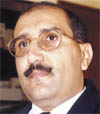Manager of ‘SPAVT’ to YT: “I am very happy to have the opportunity to continue in my endeavor to make a positive contribution to the development of Yemen” [Archives:2001/48/Interview]
Yemen’s economy has suffered under the weight of a number of burdens since the 1990s, a matter causing considerable difficulties for the government as well as the common man. Among these are the heavy debts owed by the former People’s Democratic Republic of Yemen to the former USSR; an over-staffed bureaucracy; the withdrawal of crucial financial assistance from Saudi Arabia and Kuwait; the explosion in the number of Yemeni workers who returned from abroad, which led to a sharp drop in remittances; and – last but not least – the Civil War in 1994. All of the problems mentioned have wreaked havoc on the national economy, and both the war and the expatriates’ return have put an additional burden on the country in social terms as well.
In order to streamline the national economy, Yemen has embarked on an IMF-supported structural adjustment program, which has led to foreign debt relief and restructuring. In addition, many donor countries have given Yemen a hand in an attempt to help solve some of its crucial economic, technical and social problems.
Among the very active donors in Yemen is the European Commission, one of whose activities is highlighted in this interview with Mr. Gerd Winkelhane, Manager of the EC-supported project “Strengthening Priority Areas of Vocational Training in Yemen” (SPAVT).
Q: You mentioned in a previous interview with the Yemen Times that you were leaving Yemen to work at the Orientation Department of the German Development Service (DED) in Berlin. Did you expect that you would take up another assignment in Yemen, and how did it happen that you were able to return so soon with a project from a different organization?
A: At the end of May, when the interview was conducted, I had no idea that I would be offered a new post in Yemen. As it turned out, a short time later a consultancy that specializes in recruiting international development experts approached me regarding the position of manager of the project ” Strengthening Priority Areas of Vocational Training in Yemen.”
Though I had always enjoyed my association with DED, given the challenging nature of the assignment, I decided to apply for the position. The official offer was made after an interview with the relevant bureau of the European Commission that took place in Brussels in mid-July. Needless to say, I was deeply honored to receive their approval.
I am very happy to have the opportunity to continue in my endeavor to make a positive contribution to the development of Yemen and to extend the cooperation with my Yemeni partners in this important activity.
Q: Would you please give us some information about your new project?
A: As I mentioned, the project’s official title is ” Strengthening Priority Areas of Vocational Training in Yemen”, a long name, which we abbreviate to “SPAVT.” I believe the title clearly explains what our goal is.
The financial contribution of the European Commission is 7 million euro, and the contribution of the government of Yemen amounts to 1.76 million euro. The bilateral agreement was signed in 1997, and activities started at the end of the year 2000. The project’s priority areas are Hotel & Tourism, Oil & Gas and Women’s Qualification.
The overall goal of the project is to support the reform of Yemen’s vocational education and training system, and thus contribute to the reduction of unemployment and to the alleviation of poverty.
We foresee several different major areas of activity. In the Hotel & Tourism sector, it is envisaged to create a new National Hotel & Tourism Institute (NAHOTI) in Sana’a. For the Vocational Training of Women, special institutes will be installed in Sana’a, while it is probable that institutes already existing in Aden be made use of by equipping them with the needed teaching tools and materials. It is planned that the training for technicians in the Oil & Gas sector will be undertaken in a special department within the National Institute for Trainers and Instructors in Dar Saad (NITI Aden).
In order to meet the overall objectives, the institutional capacity of Yemen’s vocational training system will be strengthened at the local level through the involvement of the private sector in determining the type, level and content of the training to be provided.
Q: Why do you think concentration on vocational training is so important for the country?
A: The Yemeni Government’s awareness of the importance of vocational training is clearly demonstrated in its Human Development Report of 1998. Accordingly, in April 2001 it merged the former General Authority for Vocational and Technical Training (GAVTT) into the Ministry of Technical Education and Vocational Training.
I personally agree completely with the government’s assessment that vocational training is of major significance for Yemen. We need only to look at the fact that within the next several years, it is estimated that some 600,000 school graduates will flow into the labor market annually. This, combined with the country’s unmistakable need for skilled employees, establishes high-quality vocational training as a major development priority. Women’s qualification also needs to be given high emphasis. I would like to use this opportunity to announce that we are planning a Communication Strategy Workshop for this project component which will be held at the Taj Sheba hotel at the end of this coming December. It is foreseen that representatives of different governmental institutions as well as NGOs and donor organizations will participate..
Q: There are other international organizations that support vocational training. Will there be coordination between your project and any of them?
A: Yes, of course. Given vocational training’s high importance for the overall development strategy of the country, it is quite logical that various international organizations are supporting this endeavor. Close cooperation with all other donors in the field will be an integral part of our work.
Q: Do you think you will benefit from your previous position as Director of DED Yemen in your new post?
A: No doubt. The experience I gathered through my former position will help me in many regards. Throughout the duration of my assignment, DED always gave special emphasis to the vocational training sector and provided Yemen with quite a number of development workers in this area. Therefore, I have an excellent relationship with the leading figures in the field.
Also, I am happy to have established an excellent level of cooperation with the Ministry of Planning and Development and to have gathered important experience in working with Yemeni institutions in general. Over the years, my personal relationships with colleagues and counterparts in all of the relevant Yemeni government agencies have proven to be very fruitful and friendly.
Q: Is there any cooperation between you and the DED?
A: Up to now there is no relationship between the SPAVT project and DED whatsoever. However, in my opinion, this project provides excellent preconditions for successful cooperation between an EU-funded project and the DED.
Q: What is your relationship to the German House for Culture?
A: I am one of the founding members of the German House and try to support this institution to the utmost possible extent. I regard it as a very important initiative that deserves all the support it can attract.
Q: Any further comments?
A: As I said in the previous interview, I regard the Yemeni people as very good friends and open-minded partners. Therefore, I am looking forward optimistically to my new responsibilities and fully expect excellent results, in sha’ allah.
——
[archive-e:48-v:2001-y:2001-d:2001-11-26-p:./2001/iss48/intrview.htm]


